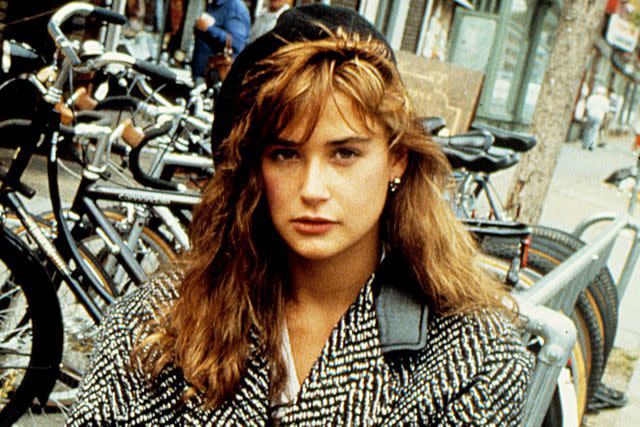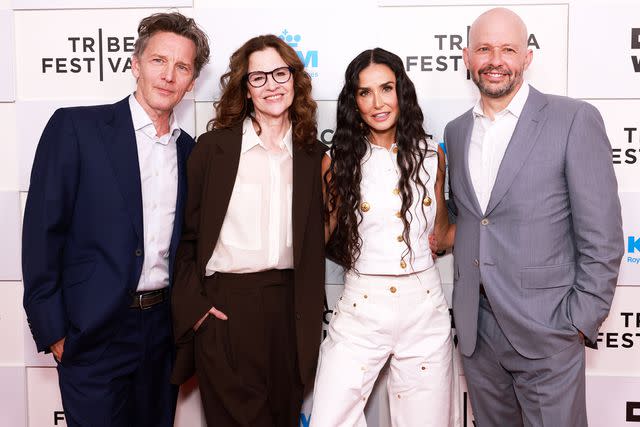Demi Moore recalls her 24/7 sober companion on “St. Elmo's Fire ”set, says director 'stuck his neck out for me'

"They could have easily just found someone else."
Demi Moore is revisiting her days on the set of St. Elmo’s Fire, revealing to former costar Andrew McCarthy that she had a 24/7 sober companion on set with her amid her addiction struggles.
The two reconnect in McCarthy’s Hulu documentary Brats, a thoughtful excavation of the origins of the "Brat Pack" label coined by New York Magazine reporter David Blum in his 1985 feature profile of Emilio Estevez. Encompassing ‘80s actors at the top of their games with Estevez hailed as the "unofficial president," the Brat Pack — a nod to the Rat Pack of the ‘50s — included Molly Ringwald, Ally Sheedy, Judd Nelson, Rob Lowe, Moore, and McCarthy.
In conversation with her fellow Brat Pack alum, Moore recalls director Joel Schumacher going to bat for her during that period in her life.
Related: Andrew McCarthy explains why Molly Ringwald and Judd Nelson aren't in his Brat Pack documentary
"I remember the first time I saw you,” McCarthy says to Moore. “We were on the soundstage at Columbia for St. Elmo’s Fire. My memory is Joel kind of brought you in and presented you to the room as this creature that he’s created. And it was just so weird. I just remember [thinking], ‘Why is Joel treating her like that?'"

Columbia Pictures/courtesy Everett
Demi Moore in 'St. Elmo's Fire'"But you know what was so beautiful," Moore says, "is he really stuck his neck out for me because it's not like I had any box office draw. We were all just beginning. I didn't have anything to really warrant him sticking by me. They paid to have a sober companion with me 24/7 during the whole shooting."
McCarthy replies, "Did they? I didn't even notice."
Want more movie news? Sign up for Entertainment Weekly's free newsletter to get the latest trailers, celebrity interviews, film reviews, and more.
"They could have easily just found someone else," Moore notes. "Going to treatment, they were like, 'We want you to check in.' I'm like 'No, no, I'm starting a movie.' And they said, 'Yes, but what's more important to you: the movie or your life?' And I said, 'The movie! C'mon, what are you talking about?' For me, I didn't have any value for myself. I think I was so fearful of failing, fearful of losing, and desperate to kind of fit in [and] belong. My need to please was definitely on high alert."
Moore, who has been open about her past substance abuse, went to rehab before filming the 1985 coming-of-age film centered on a group of college graduates adjusting to the trials of adulthood. She remained sober for two decades before relapsing and seeking treatment in 2012. Moore has been sober ever since.

ABC/Michael Le Brecht II
Andrew McCarthy, Ally Sheedy, Demi Moore, and Jon Cryer at the New York premiere screening of 'Brats'The documentary follows McCarthy as he comes to terms with the label he once perceived as detrimental, featuring archival interviews and reunions with familiar faces. In it, Moore concedes to McCarthy that she didn’t take the Brat Pack label "as personal" as he did, observing that it didn't have the same damaging impact on her. "Why did we take it as an offense?" she ponders. "Why did we take it as something bad?"
Related: Demi Moore reveals her single regret over Brat Pack reunion documentary: 'My only wish'
"Well, because you’re called a brat," McCarthy offers.
"It’s because we were young," says Moore.
"And we were afraid we were brats," adds McCarthy.
"It definitely really irritated me," Moore admits. "I felt a sense of it being unjust. I just felt like it didn’t represent us and felt like it was a real limited perspective. It stayed with me for a while, but I don’t know if I took it as personal over time as you did." She adds, "I look at everything as happening for us, not to us. And you can't be selective with that. The fact that that came out and it tried to diminish us was also an opportunity to rise above, to say 'No, I am much more than that.'"
"For me," McCarthy says, "that’s years in the process to come to that kind of [mindset]. I think when my life started to become more important than my career, I started to step back and have the perspective that allowed me to do what we’re talking about now — to see it as a good thing. I gave it so much power."
Brats is streaming on Hulu.
Read the original article on Entertainment Weekly.


